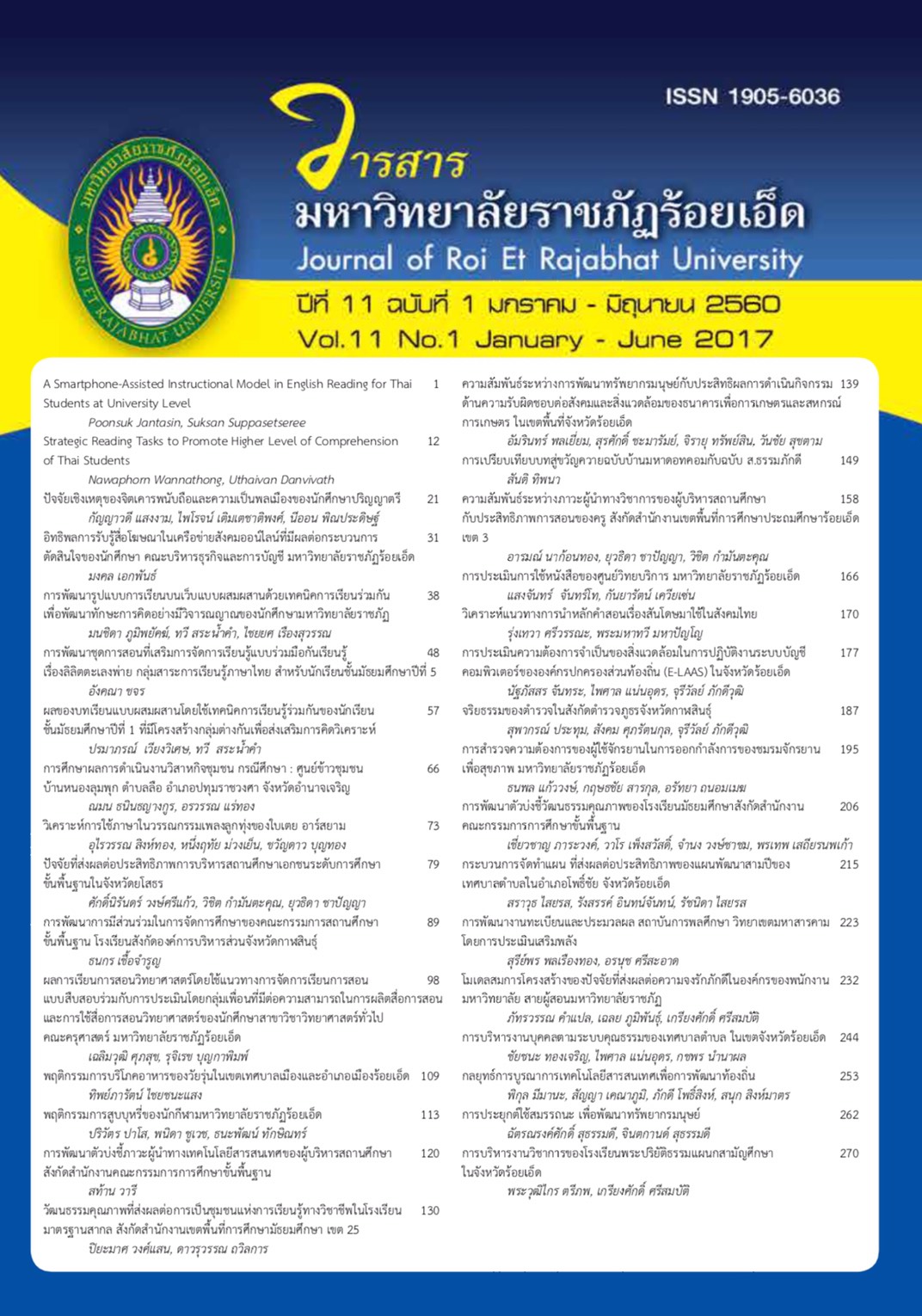Development of Quality Culture Indicators of Secondary Schools under the Office of the Basic Education Commission
Keywords:
Indicator, Quality cultureAbstract
The objectives of this study were to develop quality culture indicators of secondary schools under the Office of the basic Education Commission and to examine the goodness-of-fit of the confirmatory factor analysis model of quality culture indicators of secondary schools under the Office of the basic Education Commission with the empirical data. The study was conducted in 3 phases. Research conceptual framework was constructed in Phase 1 by the analysis of related documents and studies, as well as interviewing 5 academic experts. Phase 2 was the development of the quality culture indicators by enquiring 21 experts for 3 rounds, using Modified Delphi Technique. Goodness-of-fit test of the quality culture indicators of quality culture indicators of schools under the Office of the Basic Education Commission structural model with the empirical data was executed in Phase 3. The subjects were 693directors and teachers in World- Class Standard School, selected through stratified random sampling. Research tool used was 5 level rating scale questionnaire. The data was then analysed to find the basic statistics. LISREL program was employed to analyse the confirmatory factors.
The study results could be concluded as follows: 1. Quality culture indicators of secondary schools under the Office of the basic Education Commission comprised of 8 major components, 31 minor components and 123 indicators. They
could be further classified as follows: 17 indicatorson Quality Leadership,16 indicators on teachers and education personnel, 22 indicators on quality student, 14 indicators on strategy of quality improvement, 14 indicators on continuous quality improvement, 9 indicators on quality team, 19 indicators on quality system, 21 indicators on quality outcomes 2. Confirmatory factors analysis model of quality culture indicators of secondary schools under the Office of the basic Education Commission has goodness-of-fit with the empirical data (Chi-Square= 48.53 df=49 p=0.49394 GFI=0.97 AGFI=0.94 RMSEA=0.000 CN=827.92). The factor loading of each component could be sorted in descending order as follows : outcomes of quality (1.00) quality system (0.96) team quality (0.59) quality of student (0.22) continuous quality improvement (0.14) quality Leadership (0.03) quality of teacher (0.03) and quality of strategy (0.02)
References
การศึกษา (องค์การมหาชน).
ช่วงโชติ พันธุเวช. (2552). การจัดการคุณภาพ TQM (Total Quality Management). พิมพ์ครั้งที่ 2 กรุงเทพฯ:
มหาวิทยาลัยราชภัฏสวนสุนันทา.
นิภาพร แสนเมือง. (2557). การพัฒนาตัวบ่งชี้ภาวะผู้นำเชิงรุกของผู้บริหารโรงเรียนขยายโอกาสทางการศึกษา
สังกัดสำนักงานคณะกรรมการการศึกษาขั้นพื้นฐาน. วิทยานิพนธ์ ปร.ด. สกลนคร : มหาวิทยาลัยราชภัฏสกลนคร.
รัตนา ดวงแก้ว. (2556ก). “การประยุกต์ใช้งานวิจัยเพื่อพัฒนาคุณภาพการศึกษา” ในประมวลสาระชุดวิชาการวิจัย
การบริหารการศึกษา. หน่วยที่ 14 หน้า 1-79 นนทบุรี สาขาวิชาศึกษาศาสตร์ มหาวิทยาลัยสุโขทัยธรรมาธิราช.
วัชราภรณ์ ทีสุกะ. (2557). การพัฒนาตัวบ่งชี้การบริหารเชิงกลยุทธ์ของผู้บริหารการศึกษา สำนักงานเขตพื้นที่การศึกษา
ประถมศึกษา. วิทยานิพนธ์ ปร.ด. สกลนคร : มหาวิทยาลัยราชภัฏสกลนคร.
วิไลวรรณ มีแหยม. (2551). วัฒนธรรมโรงเรียน :กรณีศึกษาโรงเรียนศรีกระนวนวิทยาคม สำนักงานเขตพื้นที่การศึกษา
ขอนแก่น เขต 4. วิทยานิพน์ ค.ม. (การบริหารการศึกษา). ขอนแก่น : มหาวิทยาลัยขอนแก่น.
สำนักงานรางวัลคุณภาพแห่งชาติ. (2553). เกณฑ์รางวัลคุณภาพแห่งชาติ ประจาปี 2553-2554 (TQA Criteria for
Performance Excellence 2553-2554). กรุงเทพฯ : บริษัท ศิวา โกลด์ มีเดีย จำกัด.
สำนักบริหารงานการมัธยมศึกษาตอนปลาย. (2553). แนวทางการดำเนินงานโรงเรียนมาตรฐานสากล. กรุงเทพฯ :
โรงพิมพ์ชุมนุมสหกรณ์การเกษตรแห่งประเทศไทย.
David Parker. (2007). Organizational TheoryDesign and Change. New Jersey : Pearson Education.
Denison Daniel R. (1990). Corporate Culture and organizational Effectiveness. New York : John Wiley & Son.
Grover, V. & Darvenport T. (2001). General perspective on knowledge management: fostering
a research addenda. General of management information system, 18(1): 5-21.
Porter, Lyman W. et. al. (1975). Behavior in Organization. Tokyo : McGraw-Hill.
Schein, E.H. (1992). Organizational Culture and Leadership. San Francisco : jossey-Bass
Downloads
Published
How to Cite
Issue
Section
License
บทความที่ได้รับการตีพิมพ์เป็นลิขสิทธิ์ของวารสารมหาวิทยาลัยราชภัฎร้อยเอ็ด
ข้อความที่ปรากฏในบทความแต่ละเรื่องในวารสารวิชาการเล่มนี้เป็นความคิดเห็นส่วนตัวของผู้เขียนแต่ละท่านไม่เกี่ยวข้องกับมหาวิทยาลัยราชภัฎร้อยเอ็ด และคณาจารย์ท่านอื่นๆในมหาวิทยาลัยฯ แต่อย่างใด ความรับผิดชอบองค์ประกอบทั้งหมดของบทความแต่ละเรื่องเป็นของผู้เขียนแต่ละท่าน หากมีความผิดพลาดใดๆ ผู้เขียนแต่ละท่านจะรับผิดชอบบทความของตนเองแต่ผู้เดียว





